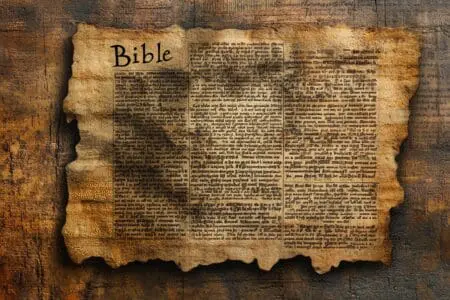Have you ever heard a wild theory that sounds just plausible enough to make you pause? I was at a trivia night a few weeks back, and someone on the other team confidently shouted that William Shakespeare wrote the King James Bible. My first thought was, “No way.” But then, a seed of doubt. The language is poetic, it’s from the right era… right? It sent me down a fascinating rabbit hole, and the real story is honestly more interesting than the myth.
Let’s get this out of the way immediately: No, William Shakespeare did not write the King James Bible. It’s one of those historical rumors that has incredible staying power, but when you look at the actual evidence, the whole idea falls apart pretty quickly.
But the question itself is what’s so interesting. Why do people think this? What was going on in the world that made these two monumental works of English literature overlap?
More in Bible Category
How Long After Jesus Died Was the Bible Written
How Long Did It Take to Write the Bible
Key Takeaways
- The Straight Answer: William Shakespeare had absolutely no role in translating or writing the King James Version (KJV) of the Bible. The project was handled by a large committee of scholars.
- Timeline Conflict: While Shakespeare was alive during the translation of the KJV (1604-1611), he was at the peak of his career as a playwright and businessman in London, not working on a massive, state-sponsored religious project.
- The Real Authors: The KJV was translated by a team of 47 scholars, all members of the Church of England, working in six separate committees. This was a collaborative effort, not the work of a single literary genius.
- Why the Myth Exists: The language of the KJV and Shakespeare’s plays both come from the same period of Early Modern English, so they sound similar to our modern ears. This, combined with Shakespeare’s legendary status, fuels the conspiracy.
So, Why Do We Even Ask if Shakespeare Wrote the Bible?
It’s a fair question. You hear the soaring language of the Psalms or the dramatic stories in Genesis, and it feels like it could have been penned by the same guy who wrote Hamlet. The truth is, they were both products of their time. The early 17th century was a golden age for the English language. It was evolving, expanding, and becoming the powerful tool we know today.
Both Shakespeare and the Bible translators were dipping their pens in the same linguistic well. They used a vocabulary and sentence structure that was common at the time, which is why they can feel so similar centuries later. It’s less about one influencing the other and more about both being shaped by the same cultural and linguistic forces.
I think there’s also a human tendency to connect greatness. We have this towering figure of Shakespeare and this monumental book, the King James Bible. It feels almost neat and tidy to imagine that one genius was responsible for both.
What Was Shakespeare Actually Doing at the Time?
This is where the story gets really clear. The translation work for the King James Bible took place between 1604 and its publication in 1611. Let’s look at what was on Shakespeare’s to-do list during those exact years:
- He was writing some of his most famous tragedies and later romances. We’re talking about plays like King Lear (c. 1605-1606), Macbeth (c. 1606), and Antony and Cleopatra (c. 1606).
- He was also writing later works like The Tempest and The Winter’s Tale around 1610-1611.
- He was a busy theater owner and manager, running The Globe Theatre, one of London’s most popular entertainment venues.
- He was a successful businessman, investing in property in London and his hometown of Stratford-upon-Avon.
Honestly, the man was at the absolute peak of his career. The idea that he would have had the time—or the inclination—to secretly participate in a massive, bureaucratic, seven-year translation project just doesn’t line up with the historical record. His hands were completely full.
If Not Shakespeare, Then Who Actually Wrote the King James Bible?
This is the part of the story that gets overlooked, and it’s a shame because it’s a testament to incredible scholarship and collaboration. The project wasn’t the brainchild of some lone poet; it was a state-sponsored initiative with a clear goal.
King James I of England commissioned the new translation in 1604. He wanted a definitive English Bible that would unify the church and be the standard for all of England. He wasn’t a fan of the other popular English translation at the time, the Geneva Bible, because it contained footnotes with political commentary that challenged the monarchy. He wanted a Bible for the people, but one that also reinforced his authority.
The Dream Team of Scholars
To get the job done, King James assembled a team that would make you dizzy. A group of 47 of the best linguistic scholars in the kingdom were brought together. These weren’t poets or playwrights; they were academics, clergymen, and theologians who were masters of Greek, Hebrew, and Aramaic.
They were split into six committees, with each committee assigned a different section of the Bible to translate.
- Two committees at Westminster: Handled Genesis through 2 Kings, and the Epistles.
- Two committees at Cambridge: Worked on 1 Chronicles through the Song of Solomon, and the Apocrypha.
- Two committees at Oxford: Translated Isaiah through Malachi, and the Gospels, Acts, and Revelation.
This was a highly organized and rigorous process. Each scholar would produce their own translation of a passage, and then the committee would meet to compare their work, debate word choices, and come to a consensus. It was then reviewed by the other committees to ensure consistency. It was the opposite of a one-man show. You can read more about the intricate translation process on academic sites like this one from the University of Cambridge.
Is There a Secret Code in the Bible Pointing to Shakespeare?
Okay, this is where the conspiracy theory gets fun. I have to admit, when I first heard this part, I was intrigued. The most famous piece of “evidence” for the Shakespeare theory is a supposed hidden signature in Psalm 46.
Here’s how it goes: In the King James Version, the 46th word from the beginning of Psalm 46 is “shake.” And the 46th word from the end (if you don’t count the liturgical word “Selah”) is “spear.”
Shake… spear. Psalm 46. And guess how old Shakespeare was in 1611 when the KJV was published? That’s right, he was 46 years old.
Mind blown, right?
But Does the Psalm 46 Theory Hold Up?
When you take a breath and look at it with a bit of skepticism, it starts to look less like a hidden code and more like a massive coincidence.
First, the original Hebrew of Psalm 46 doesn’t contain anything that translates directly to “shake” or “spear” in those positions. The English words were chosen by the translators for their meaning in the context of the verse. It just happens that those particular words landed in those spots.
Second, think about the logistics. For this to be an intentional signature, Shakespeare would have had to convince a committee of highly respected, devout scholars to subtly alter a holy text as a little inside joke or tribute. These men took their work incredibly seriously. The idea that they would allow a playwright to embed a secret code into the word of God is pretty far-fetched. It would have been seen as blasphemous.
It’s a fantastic bit of trivia, and it makes for a great story, but it’s almost certainly just a coincidence—one of the most remarkable in literary history, but a coincidence nonetheless.
Let’s Talk About Style: Do Shakespeare and the Bible Even Sound the Same?
This was the part that originally made me wonder. The language is old, it’s poetic, it’s powerful. But when you put them side-by-side, the differences become pretty obvious.
Shakespeare’s writing is dramatic. It’s meant to be spoken aloud by actors on a stage. It’s filled with intricate metaphors, puns, and deeply personal, emotional monologues. His goal is to explore the messy, beautiful, and often tragic complexities of the human condition. Think of Hamlet’s “To be, or not to be” soliloquy—it’s a journey into one man’s tormented mind.
The King James Bible, on the other hand, has a different purpose. Its language is majestic, formal, and rhythmic. It’s designed for public reading in a church. It aims for a tone of divine authority and timeless truth. It’s less about individual psychology and more about establishing a sacred narrative.
The Nitty-Gritty of Language
Let’s break it down a bit more:
- Vocabulary: While there’s an overlap, Shakespeare had a famously colossal vocabulary, and he loved to invent new words (eyeball, swagger, bedazzled—that was him). The KJV translators, by contrast, aimed for clarity and faithfulness to the original texts. They were working from a set source, not creating from scratch.
- Sentence Structure: The KJV often uses a structure that mimics the original Hebrew, with its parallelisms and balanced clauses (“The Lord is my shepherd; I shall not want.”). Shakespeare’s sentence structure is much more varied and complex, twisting and turning to fit the rhythm of his iambic pentameter.
- Purpose: At the end of the day, a playwright and a committee of Bible translators have very different job descriptions. One is trying to entertain an audience and sell tickets; the other is trying to create a definitive text for a national religion.
While they both produced masterpieces of the English language, they were playing on different fields and for different teams.
So, What’s the Final Verdict?
After digging through the history, the timelines, and the texts themselves, the conclusion is crystal clear. Did Shakespeare write the Bible? Absolutely not.
The idea is a tantalizing mix of historical coincidence and our collective desire to connect the dots of genius. The truth is that the King James Bible was the product of a massive collaborative effort by dozens of dedicated scholars. Shakespeare was, at the same time, busy becoming the greatest playwright in the English language.
They were two separate, monumental achievements that happened to blossom during the same incredible moment in history. The fact that we can even ask the question is a testament to the enduring power of the language they both helped to shape. It’s a fun theory to entertain at a trivia night, but the real story of how the King James Bible came to be is a powerful one all on its own. It’s a story of scholarship, faith, and a king’s ambition to create a book for the ages. And that’s a truth that’s just as shocking and impressive as any myth.
Frequently Asked Questions – Did Shakespeare Write the Bible

What is the truth behind the idea that Shakespeare wrote the Bible or hid his name in Psalm 46?
This idea is based on a popular but unfounded theory that a secret code spells out Shakespeare’s name in Psalm 46. Critics point out that it is a coincidence and that the code relies on manipulating the text, not on solid evidence. The real story is that the Bible was a collaborative effort inspired by God, not an act of hidden signatures by Shakespeare.
Is there any historical evidence that Shakespeare was involved in translating the Bible?
There is no historical evidence linking Shakespeare to the translation of the Bible. His name does not appear on any translation lists, and experts agree he was not part of the translation team.
Did Shakespeare write the Bible or his own plays during the translation period?
During the time of the Bible’s translation from 1604 to 1611, Shakespeare was actively writing some of his most famous plays, such as King Lear and Macbeth. His work on these plays was separate from the translation project.
Was the Bible translated by a single person or a committee?
The Bible was translated by a committee of scholar teams, not by one person. These teams worked carefully over seven years to ensure accuracy and fidelity to the original Hebrew and Greek texts.
Did William Shakespeare help translate the King James Bible?
No, William Shakespeare did not help translate the King James Bible. The translation was carried out by a team of learned men who specialized in languages and biblical studies, working in six different groups across top English universities.




